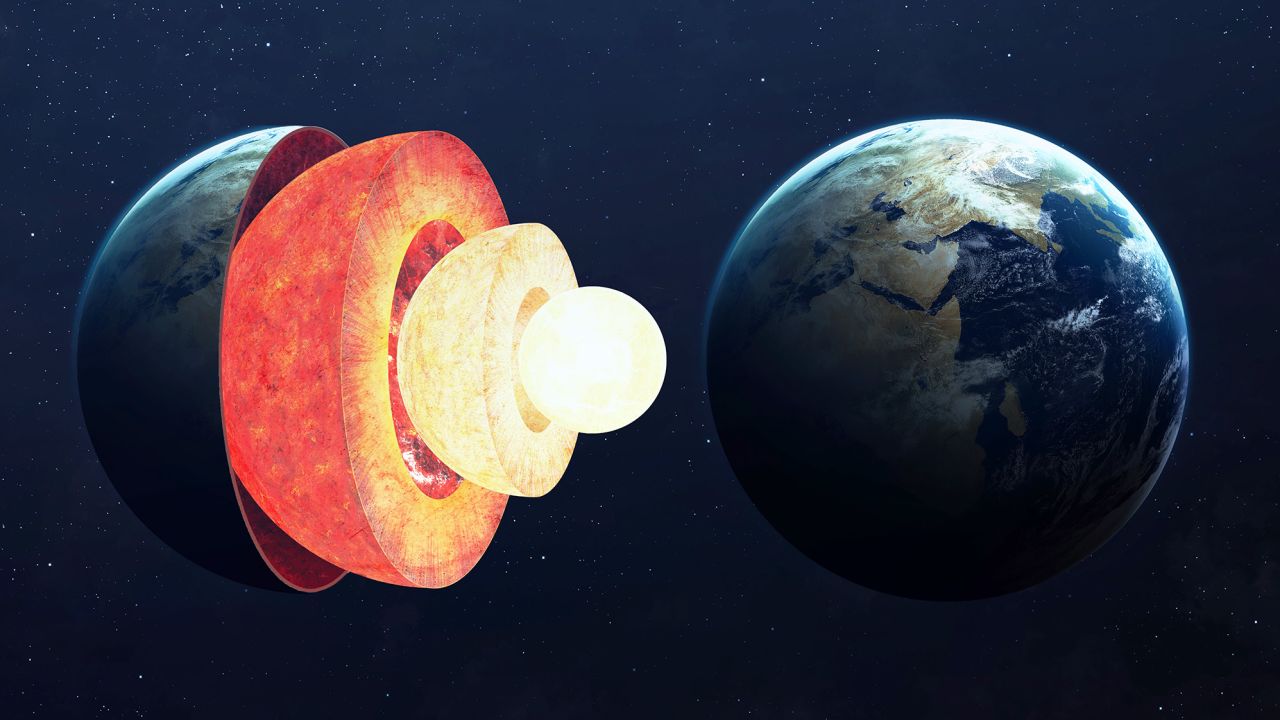The Earth's core slowed down and would rotate in the opposite direction, according to a study 1:56
Editor's Note:
Don Lincoln is a senior scientist at Fermi National Accelerator Laboratory.
He is the author of several science books for the general public, including the best-selling audiobook "The Theory of Everything: The Quest to Explain All Reality."
He also produces a series of science education videos.
Follow him on Facebook.
The opinions expressed in this commentary are solely his own.
(CNN) --
If you say a person is down-to-earth, it means they're sensible and stable, serious people who can be trusted to give careful and considered opinion.
The very meaning of the term comes from the solidity and stability of the ground on which we walk.
However, recent reports in the media have painted a different picture of what is happening below ground, one in which the Earth's core is doing some very surprising and unexpected things.
A recent paper published in the journal Nature Geoscience describes a change in the motion of the Earth's core, and with that news headlines proliferated, some claiming that the Earth's core has stopped spinning.
What does it mean that the Earth's core could have slowed down?
How does it impact our life?
But this interpretation is actually misleading.
The Earth's core does not literally stand still;
however, it is changing.
The Earth is not a solid ball;
consists of several layers.
There is the innermost core, which is a solid sphere the same size as the planet Mars.
Surrounding it is the outer core, which is liquid rock.
The next layer is the mantle, which has a consistency similar to chewy candy.
Finally there is the crust, which is the outermost layer, the place where we live.
If the Earth were a solid ball, each layer would rotate in synchrony, turning once a day.
However, due to the layered structure, it is possible that the Earth's core rotates at a slightly different rate than the surface and other layers.
And, in the 1990s, researchers used geological data taken over the previous decades to show that Earth's core was spinning slightly faster than the rest of the Earth.
The difference is small: about 1° per year faster than the Earth's surface.
This most recent study found that the core's rotation is slowing down.
It doesn't stop, but now it spins at the same speed as the Earth.
Also, it looks like the core could be slowing down, so it will eventually rotate a bit slower than Earth.
This is scientifically interesting, but far less dramatic than some of the headlines suggest.
Researchers have seen this periodic change in the rate of rotation of the Earth's core before and still debate the rate at which it occurs, with some suggesting a 70-year cycle while others suggest a much faster one.
For geologists, this is fascinating stuff.
Earth's radius is just under 4,000 miles (6,400 kilometers) and the deepest well anyone has ever dug is just over 7.5 miles (12 kilometers) deep.
The crust under Earth's continents can be around 40 miles (64 kilometers) deep, although the crust under the oceans can be much thinner.
Discovering the structure of the Earth requires indirect methods, which involve studying how fast earthquake waves travel through the Earth, or studying the rich trove of data on how sound from nuclear explosions travels through the Earth.
With a few exceptions, nuclear testing stopped in the mid-1990s.
Choppy headlines aside, this recent study confirms previous results showing that inner core rotation changes over time and helps geologists trying to figure out the mechanism by which those changes occur.
What concerns geologists is the interplay between gravitational and magnetic forces within the Earth that speed up and slow down the rotation of the core.
However, there is a much more important lesson to be drawn here, and that is that scientists can make extremely precise measurements of what is happening below the Earth's surface.
This is very important, after all, it is the only planet we have.
What happens below the Earth has enormous potential consequences for humanity.
Consider the supervolcano that is dormant beneath Yellowstone National Park.
Every half million years or so (sometimes more), Yellowstone transforms into a volcano spewing hundreds or thousands of times more ash into the atmosphere than the 1980 eruption of Mount St. Helens.
While some have worried that the Yellowstone supervolcano might erupt again, recent studies have allayed concerns that the danger is imminent.
However, given the magnitude of the damage that would occur from such an eruption, it is imperative that geologists continue to monitor what is happening.
And there is much more happening below the surface of the Earth.
Earth's magnetic field guides ships at sea and lost hikers to safety.
It is easy to believe that the usual compass will always work, however, geologists have shown that the Earth's magnetic field is not constant.
In fact, every few hundred thousand years, the field changes and magnetic south becomes north, and vice versa.
And while a spin is probably not imminent, the location of magnetic north changes even on human time scales.
In the early 1900s, it was in northern Canada, however it has moved into the Arctic Ocean and is now nearing Siberia.
By understanding more about the inner workings of Earth, scientists will be able to help humanity prepare for significant changes in Earth's magnetic field.
If it happened, we would have to change all the instrumentation that is based on compasses to navigate.
We have only one planet and what happens inside it can affect us all.
It's imperative that geologists continue to study what's going on inside our globe, and this recent measurement of changes in the rotation of Earth's core gives us some reassurance that we're keeping up.
And…come on and admit it…that's great.
Planet Earth

